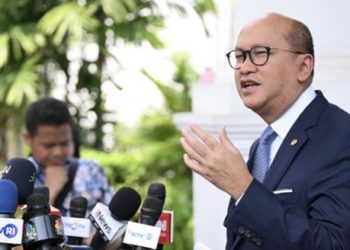Jakarta, Indonesia Sentinel — PT Mandiri Sekuritas predicts Indonesia economic GDP growth to remain stable at 5.1% in 2025, bolstered by recovering domestic demand and household consumption. However, global economic challenges and policy changes may impact growth dynamics.
Key Drivers of Growth
Mandiri Sekuritas Chief Economist Rangga Cipta stated that the recovery in household consumption and the resurgence of capital investment cycles would drive growth. Both domestic and foreign direct investments are expected to play a crucial role in revitalizing the economy.
“In 2025, inflation is forecasted to average 2.6%, up from 2.3% in 2024. This is partly due to the low base effect of weak core inflation and the planned VAT increase to 12%,” Rangga said in an official release on November 24, 2024.
Additionally, the Rupiah is projected to average IDR 15,700 per U.S. dollar, reflecting modest appreciation compared to 2024 levels. However, the U.S. dollar’s strength, driven by Trump administration policies focused on inflation control and trade protectionism, may limit further gains.
Challenges to Growth
Despite the optimistic outlook, some experts view the government’s ambitious 8% growth target for 2025 as unrealistic. Senior economist Fadhil Hasan from Indef emphasized that maintaining household purchasing power should be prioritized over aggressive tax increases.
“An 8% growth target is highly unrealistic, especially with the planned VAT hike to 12%. This policy will weaken household purchasing power, which has been the backbone of Indonesia’s economic growth,” Fadhil said during a seminar on November 22, 2024.
Fadhil pointed out that household consumption contributes the largest share to GDP. Increasing taxes indiscriminately could deter spending and slow economic momentum.
Alternative Policy Recommendations
To achieve sustainable growth, Fadhil urged the government to adopt more equitable and selective tax policies.
“Instead of increasing VAT universally, implementing targeted taxes like super-rich taxes and windfall profit taxes could raise state revenue without eroding household purchasing power,” he suggested.
Fadhil’s recommendations align with broader economic goals, aiming to balance fiscal responsibility with protecting consumer spending.
President Prabowo Secures Rp135 Trillion Investment During Visits in UK
Conclusion
As Indonesia navigates its 2025 economic landscape, it faces a delicate balancing act between fostering growth and addressing global and domestic challenges. While Mandiri Sekuritas projects steady growth, achieving ambitious targets requires careful policymaking and a focus on maintaining public confidence in the economy.
(Becky)


























